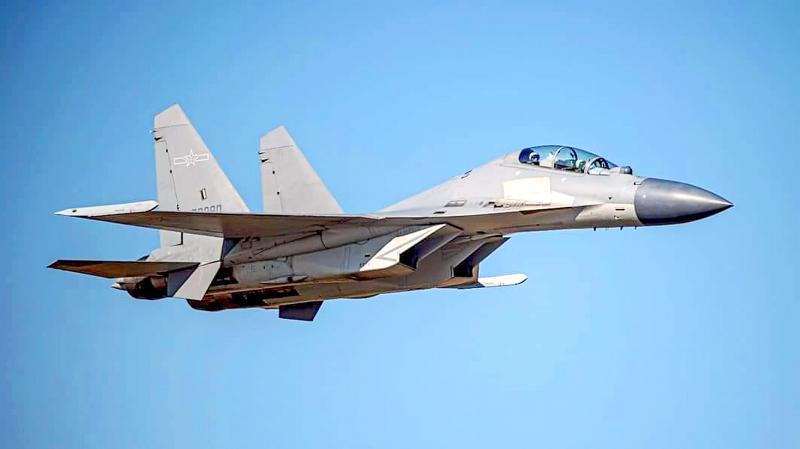Premier Su Tseng-chang (蘇貞昌) yesterday criticized China after 38 of its military aircraft crossed into Taiwan’s air defense identification zone (ADIZ) on Friday, the most in a single day since Taiwan began issuing a tally on such incursions in September last year.
On Friday evening, the Ministry of National Defense reported that 25 Chinese planes had crossed into the nation’s southeastern ADIZ, between Taiwan proper and the Pratas Islands (Dongsha Island, 東沙群島).
It identified the planes as 18 J-16 fighter jets, four SU-30 fighters, two H-6 bombers and one Y-8 anti-submarine warfare plane.

Photo courtesy of the Ministry of National Defense
Late on Friday night, the ministry reported that 13 Chinese aircraft had entered the southwestern ADIZ, identifying them as 10 J-16 fighter jets, two H-6 bombers and one KJ-500, which is a third-generation airborne early warning and control aircraft.
The J-16 fighters and the H-6 bombers entered the ADIZ from the direction of China’s Fujian and Guangdong provinces, crossed the Bashi Channel and returned to China, while the KJ-500 entered the ADIZ from the direction of Guangdong, before returning to China, ministry data showed.
The incursions came on the 72nd anniversary of the founding of the People’s Republic of China.
In response, Taiwan’s air force scrambled planes to monitor the Chinese aircraft, issued radio warnings and mobilized air defense assets, the ministry said.
Before Friday’s incursion, the most Chinese military planes to enter the ADIZ in a single day was 28 on June 15, two days after the G7 issued a statement highlighting the importance of peace and stability in the Taiwan Strait.
Later yesterday, the ministry said that another 20 Chinese air force planes had crossed into the ADIZ.
“China has been wantonly engaging in military aggression, damaging regional peace,” Su said.
China has used a wide range of bullying tactics against Taiwan, but the actions have increasingly been renounced by other countries, Su said.
Shu Hsiao-huang (舒孝煌), a research fellow at the Institute for National Defense and Security Research, said that the J-16 is the main fighter jet of China’s air force, and mobilizing 16 of them was perhaps aimed at familiarizing its pilots with the air space around Taiwan.
It could be a training exercise to acclimatize pilots to long-range flights, as well as coordinating with bombers, he added.
Taiwan should boost defenses in its southwestern air space, he said, adding that improving its intelligence gathering capabilities in the area could give the military more time to deploy mobile anti-air missile trucks on the east coast.
Retired air force deputy commander lieutenant general Chang Yen-ting (張延廷) said previous assumptions that Taiwan’s east coast is relatively safe are no longer true.
The route taken by the Chinese planes demonstrates that the whole of Taiwan is now within bombing range of its air force, and Taiwan’s military should begin establishing hardened aircraft shelters, Chang said.
Additional reporting by Wu Su-wei and Reuters

CHAOS: Iranians took to the streets playing celebratory music after reports of Khamenei’s death on Saturday, while mourners also gathered in Tehran yesterday Iranian Supreme Leader Ayatollah Ali Khamenei was killed in a major attack on Iran launched by Israel and the US, throwing the future of the Islamic republic into doubt and raising the risk of regional instability. Iranian state television and the state-run IRNA news agency announced the 86-year-old’s death early yesterday. US President Donald Trump said it gave Iranians their “greatest chance” to “take back” their country. The announcements came after a joint US and Israeli aerial bombardment that targeted Iranian military and governmental sites. Trump said the “heavy and pinpoint bombing” would continue through the week or as long

TRUST: The KMT said it respected the US’ timing and considerations, and hoped it would continue to honor its commitments to helping Taiwan bolster its defenses and deterrence US President Donald Trump is delaying a multibillion-dollar arms sale to Taiwan to ensure his visit to Beijing is successful, a New York Times report said. The weapons sales package has stalled in the US Department of State, the report said, citing US officials it did not identify. The White House has told agencies not to push forward ahead of Trump’s meeting with Chinese President Xi Jinping (習近平), it said. The two last month held a phone call to discuss trade and geopolitical flashpoints ahead of the summit. Xi raised the Taiwan issue and urged the US to handle arms sales to

State-run CPC Corp, Taiwan (CPC, 台灣中油) yesterday said that it had confirmed on Saturday night with its liquefied natural gas (LNG) and crude oil suppliers that shipments are proceeding as scheduled and that domestic supplies remain unaffected. The CPC yesterday announced the gasoline and diesel prices will rise by NT$0.2 and NT$0.4 per liter, respectively, starting Monday, citing Middle East tensions and blizzards in the eastern United States. CPC also iterated it has been reducing the proportion of crude oil imports from the Middle East and diversifying its supply sources in the past few years in response to geopolitical risks, expanding

An Emirates flight from Dubai arrived at Taiwan Taoyuan International Airport yesterday afternoon, the first service of the airline since the US and Israel launched strikes against Iran on Saturday. Flight EK366 took off from the United Arab Emirates (UAE) at 3:51am yesterday and landed at 4:02pm before taxiing to the airport’s D6 gate at Terminal 2 at 4:08pm, data from the airport and FlightAware, a global flight tracking site, showed. Of the 501 passengers on the flight, 275 were Taiwanese, including 96 group tour travelers, the data showed. Tourism Administration Deputy Director-General Huang He-ting (黃荷婷) greeted Taiwanese passengers at the airport and